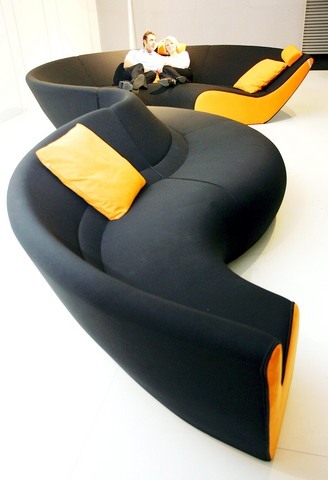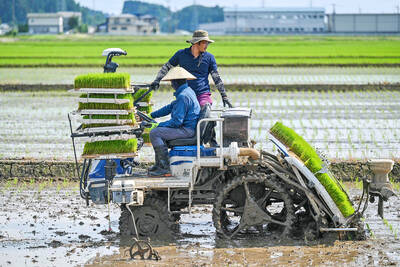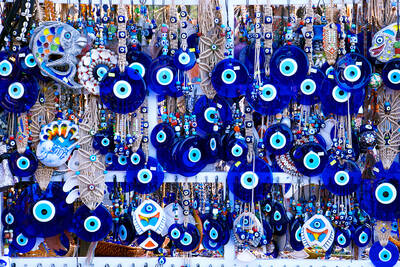Today, most people have at least one couch in their house. They like to sit on their couch and watch TV. But it might surprise you to find out that throughout history, couches have been used for many different purposes.
For example, a long time ago, only rich people had couches. In the Middle East, kings used couches as their thrones. In Italy, people didn't sit in chairs while they ate. Instead, they put couches around their table and ate while lying down. Regular people have been able to afford couches only for a few hundred years.
Today, people like to sit on couches to relax. If someone likes to spend too much time relaxing on the couch and not working, you can call him or her a "couch potato." (Marc Langer, Staff Writer)

PHOTO : AP
今天,多數人家裡至少都有一張沙發。人們喜歡坐在沙發上看電視。不過,了解到歷史上沙發的用途五花八門,可能會讓你大吃一驚。
例如,在很久以前,有錢人才有沙發。中東的國王將沙發做為王位。義大利人吃東西時不坐在椅子上,而是在餐桌四周擺上沙發,躺下來吃東西。一般人買得起沙發,也不過才幾百年的歷史。
今日,人們喜歡坐在沙發上休息。假如某個人喜歡終日窩在沙發上無所事事,你就可以稱那個人為「couch potato」(沙發馬鈴薯)。
(翻譯:賴美君)

Rice is essential to Japanese culture, tradition and politics. People take pride in the oval-shaped sticky Japonica grain, which is still a staple even though total consumption has fallen over the decades. But since last summer, prices have soared as supplies have fallen short of demand. The government has long paid farmers to cut back on rice acreage, and change to other crops to keep rice prices relatively high. To cope with shortfalls this year, the government has released rice reserves. But the grain has been slow to reach supermarket shelves. Anger over that was part of the reason the Agriculture Minister

In Taiwan, 7-Eleven convenience stores can be found on almost every street corner. With over 84,600 stores across 20 countries, 7-Eleven has more locations than any other retail business on Earth. For millions of people, the chain is an important part of daily life, providing coffee, quick meals, and essential items for those __1__. The history of 7-Eleven began nearly 100 years ago in Dallas, Texas. In 1927, the Southland Ice Company began selling blocks of ice that were used to keep fridges cool. Shortly after opening, the company __2__ its offerings to include groceries like milk, eggs, and

Step into any corner of Turkiye, and you’ll likely encounter the iconic “Evil Eye,” known as “nazar boncu?u” in Turkish. This striking blue glass ornament is shaped like an eye with concentric circles of dark blue, white, and light blue. While its name in English suggests something threatening, it’s actually a charm designed to ward off misfortune. The origins of the nazar boncu?u can be traced back to ancient Mediterranean and Middle Eastern traditions. The word nazar comes from Arabic, meaning “gaze,” while boncu?u translates to “bead” in Turkish. Central to the nazar boncu?u’s mythology is the idea that

Continued from yesterday(延續自昨日) https://www.taipeitimes.com/News/lang In 1946, the company adopted the name 7-Eleven to reflect its newly extended __3__, from 7am to 11pm, a novel concept at the time. As a rapidly growing company, it began offering franchise opportunities in the 1960s. In 1974, the first 7-Eleven in Japan was opened by the supermarket company Ito-Yokado. The Japanese franchises were __4__ successful that by 1991, Ito-Yokado was able to acquire a 70 percent stake in Southland Corporation. Its investments eventually resulted in full ownership of 7-Eleven, which paved the way for the Japanese company to enter the international market. Since then, 7-Eleven